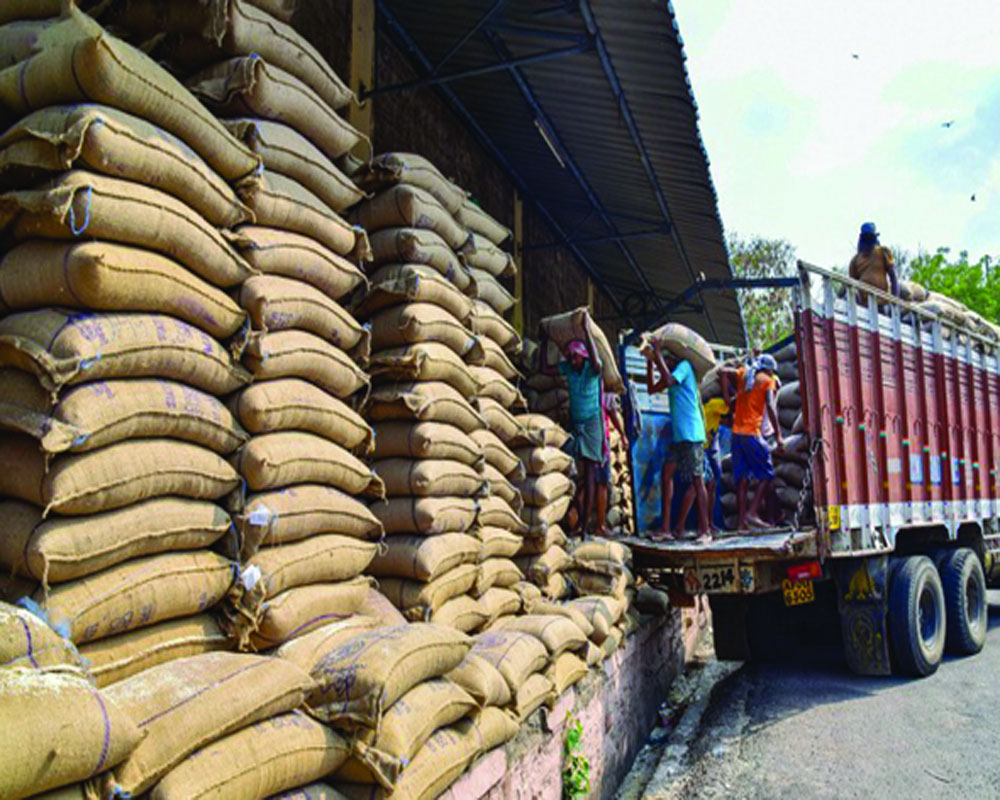The FCI must assist farmers in selling food grain through auction to private channels under its supervision
After independence, due to inadequate irrigation infrastructure, there was consistent shortage of food grain that used to aggravate in drought years. In the 1960s, green revolution was pursued. In 1965, Food Corporation of India (FCI) was incorporated for storing buffer stocks. To incentivise higher production, in 1965-66, Minimum Support Price (MSP) was introduced. As a result, India became surplus inwheat and rice production. Thereafter, open market prices couldnot keep pace with other industrial products. Food grain exports were highly restricted. Low sale price at farm gate and the inflation in the farm inputs impacted farmer's incomes.Agro input subsidies couldnot compensate such losses. This caused perennial distress, suicides and agitations among farmers. Therefore, ways and means must be designed to ensure MSPto all farmers for all produce except perishable produce. The moot question is,how to make it feasible for the Government?
In FY-2020,under MSP, the Government had procured23 eligible crops at barely 26 per cent of its value.Despite this, the unsold stock with FCI is about 32 million tonsand 24 million tons withthe States. The debt of FCI has also exceeded Rs. 4 lakh crore, incurringhuge interest and storage costs. Therefore, it is not feasible for the Government to buy the entire production at MSP.
Unlike industrial products, the production cycle of food grain is too long. Hence, it isto be procured and stored during crop arrival season b and then sold to ultimate consumers as per demand. India must develop food processing industries and trade channels for sharing the procurement burden during crop arrival season. But private trade channels might exploit farmers. Considering the complexity, India needs a new regime of MSP surmounting past legacy which will enable the farmers to get MSP while the fiscal and debt burden of the Government and FCI also reduces except during the initial years.
The FCImust assist farmers in selling food grainthrough auction to private channels under its supervision. The floor price must be kept about 93-95 per cent of MSP. FCI should fix quality standards and provide testing facility to avoid any arbitrary deduction by purchaser on the quality ground. Unsold stocks must be essentially stored by FCI and the cheap loan may be extended to farmer up to 90 per cent of stock value at MSP price. Same can be refinanced by banks to FCI at SLR rate. In the absence of such stocking facility, the farmer is compelled to sell the produce at distress prices to trade channels.
AGoods Receipt(GR) may be issued to farmersagainst stocks mentioning the quantity, quality and loan amount. The validity period of such GRs may be 5-6 months. They must be tradable in the open market, e-NAM and Commodity exchanges. The FCI mustassistand chargea nominal fee of 0.5 per cent of sale value. Interest and storage charges may be levied at 9 per cent per annum onthe stock value. Thatmay be recovered from the ultimate buyer during delivery of goods. The balance money may be remitted to farmers.This will eliminate interest and storage cost of FCI.
If the stock is not sold by farmers within validity period of GR, they shall lose selling rights and it shall be deemed sale to FCI at MSP. After the expiry of validity of GR, FCI shall remit balance money after adjusting debt, interest and storage charges.
With above arrangements, the farmers might get about 95 per cent of MSP. Hence, MSP may be increased by 5-7 per cent. After stabilizing the system, there are fair chances for getting higher price to farmers. The FCI shall also be benefited since; its debt burden and storage costshall reduce. Rather, it might earn gross profit in future years from service fee and storage charges. In the meantime, FCI should increase the network of Mandis and storage capacity. It should also buildmarketing infrastructures.
In this process, the stock with FCI might increasedue to excess production or poor market demand. In such situations, the FCI must quickly export directly or through trade channels. The Government must encourage export and giveexport incentives to compensate for the loss to the FCI and trade channels and processing industries. By this, the debt of the FCI shall reduce and the storage capacity shall be available for the arrival of the fresh crop.


























